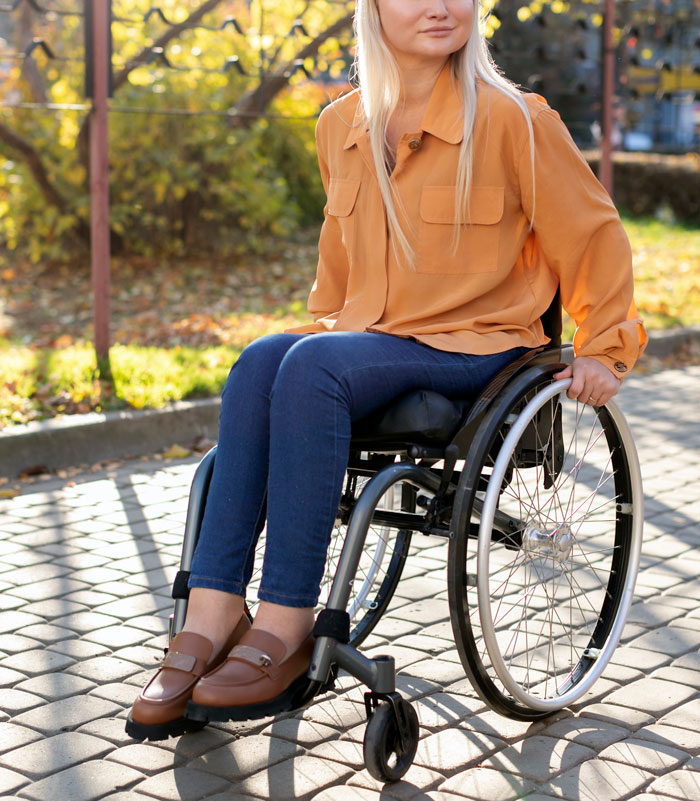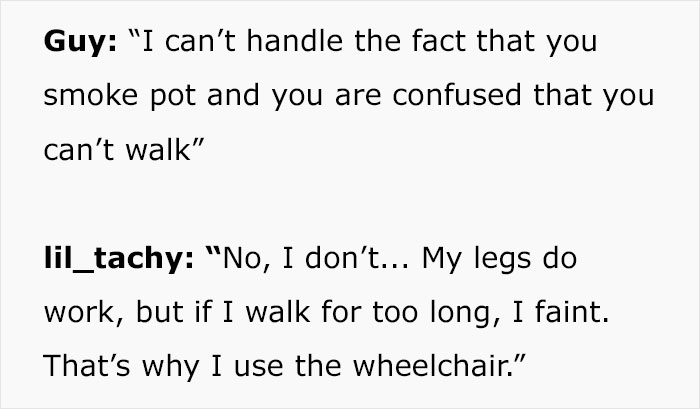Not all disabilities are visible. In fact, most aren’t.
But one man couldn’t wrap his head around that, and instead of minding his own business, he lashed out at a woman who uses a wheelchair, accusing her of faking her illness just because she could walk.
She shared the uncomfortable encounter on TikTok, and the video quickly went viral, with millions expressing outrage at his ableist outburst.
Here’s how it all went down.
The woman relies on a wheelchair due to her disability

But when a stranger saw her walk, he decided to confront her, convinced she was faking it




What followed was a very uncomfortable exchange






Watch the full video below
@lil_tachy Pulled out my camera because this guy was watching me load my wheelchair back into my car after being in the store with it. I’ve had POTS for 7 years now and most of the time, I don’t need a wheelchair, but ther are times where I can’t get around without one. I went through a 4 month long flare where I couldn’t leave the house at all unless I was in a wheelchair, and I’m just now starting to come out of that flare. Long story short, I don’t use the wheelchair unless I need to. I wasn’t in a handicap spot, I wasn’t in this guy’s way, or impeding his ability to shop. Literally just minding my own business. #xyzbca #chronicillness #chronicallyill #pots #posturalorthostatictachycardiasyndrome #dysautonomia #dysautonomiaawareness #wheelchair #ambulatorywheelchairuser #disability #karan ♬ original sound – Kirsten🏳️🌈
What exactly is POTS?
Postural orthostatic tachycardia syndrome, or POTS for short, is a chronic condition that affects the autonomic nervous system, which controls things like heart rate, blood pressure, and breathing. For people with POTS, simply standing up can cause their heart rate to spike, often leading to dizziness or even fainting.
But the symptoms go far beyond that. Many people also experience chest pain, blackouts, nausea, fatigue, headaches, brain fog, digestive issues, shaking, and difficulty sleeping.
It’s estimated that POTS affects between 1 to 3 million people in the U.S., most of them women. Public figures like singer Halsey and Olympic swimmer Katie Ledecky have spoken out about their experiences with the condition, helping to raise awareness.
While there’s no cure, POTS isn’t life-threatening and doesn’t shorten your life expectancy. It can often be managed with medication, lifestyle changes, and a careful balance of diet and physical therapy.
That said, the condition can get worse depending on what’s happening in your body. Common triggers include:
- Strenuous physical activity
- Illness or infection
- Standing or walking for long periods
- Hot weather or hot showers
- Menstruation or pregnancy
- Recovering from surgery or injury
For some, symptoms can be kept under control with relatively minor adjustments. But for others, POTS can be debilitating. Some struggle to walk even short distances. Some are bedridden and need help just getting to the bathroom. About 50% of people with POTS are unable to attend work or school.
And despite all this, it’s still wildly misunderstood.
Many people assume it’s not a serious condition because common symptoms don’t seem severe. Even some medical professionals aren’t familiar with it, which means many individuals don’t even realize they have it.
In the UK, the average time from first symptoms to a diagnosis is seven years. Even worse, up to 85% of patients say they were told their symptoms were “all in their head” and misdiagnosed with anxiety or depression, despite research showing POTS patients are no more likely to have psychiatric conditions than anyone else.

Image credits: Getty Images / Unsplash (not the actual photo)
How you can support someone with POTS
For those without a disability, it can be easy to overlook how inaccessible the world is and how often people with invisible conditions are treated unfairly.
A UK survey by Fish Insurance found that 39% of respondents believed people with valid disability parking permits shouldn’t use accessible parking if they didn’t appear to be struggling to walk.
Even more shockingly, 18% said that people who did show visible difficulty, like a limp or a prosthetic, shouldn’t be allowed to use those spots either.
That kind of thinking isn’t just uninformed, it’s harmful. It also shows why empathy and education matter so much.
So, what can you do to support someone living with POTS? Guide to POTS offers these helpful suggestions:
- First, start by truly listening. If someone with POTS opens up about what they’re experiencing, give them space to share and take their concerns seriously.
- Be there for them in ways that work for their energy and mobility levels. They might not be able to attend concerts or events that involve lots of walking or standing, but that doesn’t mean you can’t spend quality time together. Suggest a movie night at home or a low-key hangout instead.
- If you do end up going out, try to be flexible and patient. They may not be up for a long walk on a hot summer day or keeping a fast pace, but grabbing a bite to eat at a local café could be perfect.
- And finally, take a bit of time to learn about the condition yourself. You’ll get a much better idea of what daily life with POTS can be like.
Above all, lead with kindness. Living with a misunderstood condition like POTS can feel isolating, but knowing someone is willing to show up and listen can make all the difference.
The woman later revealed she couldn’t believe he was serious at first, until he kept going





Viewers were appalled by the way he treated her



























